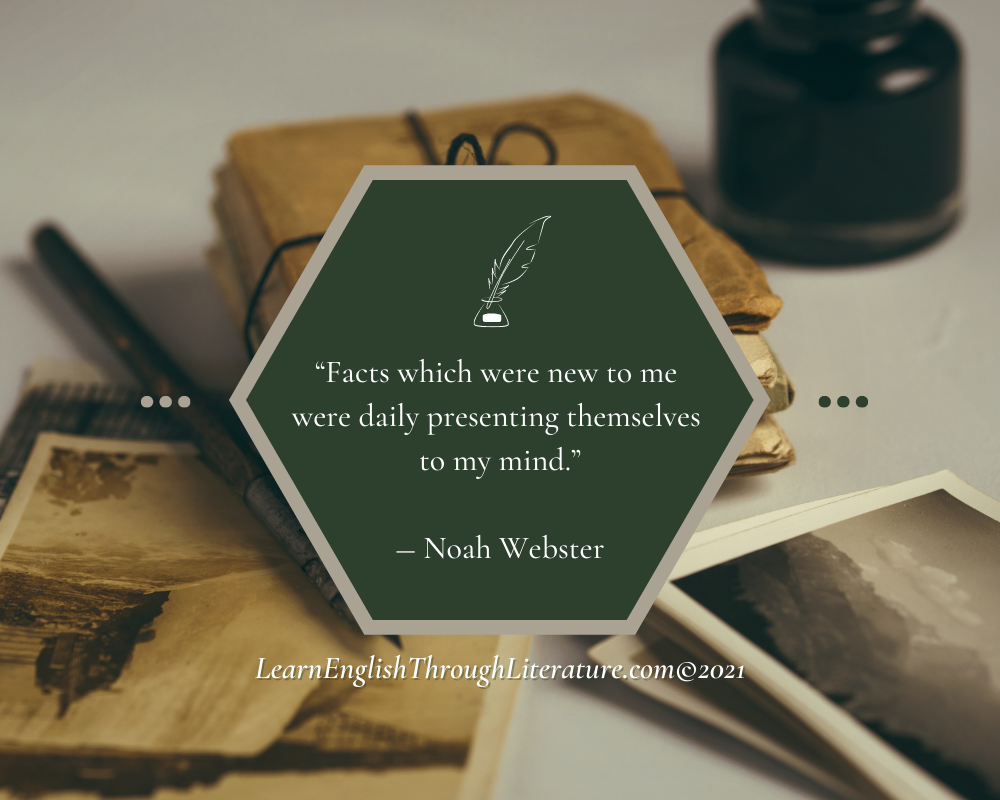As we saw in the first part of this Lesson, Samuel Johnson spent nearly ten years working on his dictionary. Our next dictionary-writer (or lexicographer), Noah Webster, probably spent decades (tens of years) preparing the research for his dictionaries. In his lifetime, he saw several editions of his dictionaries being published, and each time he tried to improve and refine what he had included in past editions (versions). ✒️
This is the story of Noah Webster and his dictionary.
…
PART 2 🇺🇲: NOAH WEBSTER’S DICTIONARY and ITS INFLUENCE ON AMERICAN ENGLISH
Noah Webster was born in 1758, so that by the time he was a young man he was old enough to participate (join) in the American War of Independence and meet some of the famous American leaders of the time, including George Washington and Benjamin Franklin. Through such meetings, he was encouraged to publish a small textbook for the purpose of teaching English to children, one that proved to be very popular and which helped to educate all American children in the values and language of their newly-founded country.
The only issue was that there was no consensus (agreement) on how American English should be spoken and spelled.
✍️ Noah Webster decided to address this issue by writing a dictionary that Americans could be proud to own and use. His first dictionary, A Compendious Dictionary of the English Language, was published in 1806. Webster included many words that were more technical than literary in his dictionary, words that reflected science and the arts.
👉 He was influenced by Johnson’s work, and as an American he consciously and carefully tried to distinguish his work from Johnson’s.
In some areas Webster allowed Johnson’s work to direct his own: notice how he (Webster) drew on (relied on, quoted) Johnson’s definition of citizen (which can be seen in Part 1 of this Lesson):
📗 CITIZEN, n. one inhabiting a city, a freeman
Webster also decided to change some of the spelling of British words such as centre, honour, programme, cheque, which then became center, honor, program, check in American English – changes which continue to be accepted today. He based his decision on the fact that these letters are not pronounced in English, so they should be moved around or left out to make full sense of the word. (💡 What he didn’t account for was that many of the original British spellings – centre, programme, honour, cheque – reflected their origins in other languages like French; also that many British speakers are more likely to use diphthongs and slightly voice those ‘missing’ letters like ‘u’ in honour). However, his second dictionary (1841) included an introduction with the ‘origin, history and connection of the languages of western Asia and Europe, with an explanation of the principles on which languages are formed’.
It was this later edition of 1841 that the poet Emily Dickinson bought and read religiously for many years, saying that it influenced her greatly. According to her biographer Martha Dickinson Bianci, ‘The dictionary was no mere reference book to her, she read it as a priest [reads] his breviary – over and over, page by page, with utter absorption.’
Webster’s dictionaries helped to define not only the scope and structure of American English, but in a broader sense a federal (or uniting of many states) kind of culture through the unity of language.
The fact that his name continues to be associated with the publishing of dictionaries in the U.S. (although under the joint name now of ‘Merriam-Webster’) shows his legacy, like that of Johnson, has endured so much longer than the many years they themselves spent researching for and writing their respective (individual) dictionaries.
👉 So the next time you pick up a dictionary, or search for a definition online, it is likely that you are turning to a project that once started with one or another of these two men. 🖋️ And hopefully this Lesson in 2 parts has given you a new appreciation for the hard work they did – long, long ago in the age of pen, quill, and ink! 📜




